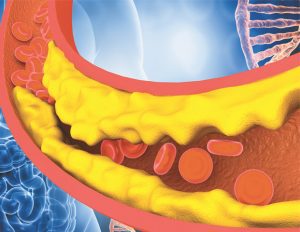 Food, family history and medicines all affect your total cholesterol. Everyone can benefit from knowing their cholesterol numbers and doing what they can to prevent or reduce high cholesterol levels. Uncontrolled cholesterol is a risk factor for heart attacks and stroke. But high cholesterol has no symptoms, so patients might not know that their cholesterol is too high – unless it’s measured by a doctor with a blood test.
Food, family history and medicines all affect your total cholesterol. Everyone can benefit from knowing their cholesterol numbers and doing what they can to prevent or reduce high cholesterol levels. Uncontrolled cholesterol is a risk factor for heart attacks and stroke. But high cholesterol has no symptoms, so patients might not know that their cholesterol is too high – unless it’s measured by a doctor with a blood test.
While some risk factors – such as family history – may be out of our control, there are other ways to reduce or prevent high cholesterol, such as exercising, eating a healthy diet, not smoking, and taking medication as prescribed. Honor National Cholesterol Education Month by asking your health care team to check your cholesterol numbers and for tips on how to control their cholesterol numbers. Adults aged twenty and older should have their cholesterol levels checked every four to six years.
• High cholesterol is a major risk factor for heart disease, which is the leading cause of death in the United States.
• People with high cholesterol are twice as likely to have heart disease than people with lower cholesterol levels.
• 73.5 million American adults (31.7%) have high low-density lipoprotein (LDL), or “bad” cholesterol.
• Fewer than 1 out of every 3 adults with high LDL cholesterol has the condition under control.
The American Heart Association offers Cholesterol 101 on their website. Below is a small portion of the information provided by the AHA to help us all make healthy heart choices and keep our numbers in check. Visit the American Heart Association website at www.heart.org to for more resources, videos, and more in-depth cholesterol educational information.
Cholesterol is a waxy substance. It’s not inherently “bad.” Your body needs it to build cells and make vitamins and other hormones. But too much cholesterol can pose a problem.
Cholesterol comes from two sources. Your liver makes all the cholesterol you need. The remainder of the cholesterol in your body comes from foods from animals. For example, meat, poultry, and dairy products all contain dietary cholesterol.
Those same foods are high in saturated and trans fats. These fats cause your liver to make more cholesterol than it otherwise would. For some people, this added production means they go from a normal cholesterol level to one that’s unhealthy.
Some tropical oils – such as palm oil, palm kernel oil and coconut oil – contain saturated fat that can increase bad cholesterol. These oils are often found in baked goods.
Cholesterol circulates in the blood. As the amount of cholesterol in your blood increases, so does the risk to your health. High cholesterol contributes to a higher risk of cardiovascular diseases, such as heart disease and stroke. That’s why it’s important to have your cholesterol tested, so you can know your levels.
The two types of cholesterol are: LDL cholesterol, which is bad, and HDL, which is good. Too much of the bad kind, or not enough of the good kind, increases the risk cholesterol will slowly build up in the inner walls of the arteries that feed the heart and brain.
Cholesterol can join with other substances to form a thick, hard deposit on the inside of the arteries. This can narrow the arteries and make them less flexible – a condition known as atherosclerosis. If a blood clot forms and blocks one of these narrowed arteries, a heart attack or stroke can result.
When it comes to cholesterol, remember check, change, and control. That is:
• Check your cholesterol levels. It’s key to know your numbers and assess your risk.
• Change your diet and lifestyle to help improve your levels.
• Control your cholesterol, with help from your doctor if needed
High cholesterol is one of the major controllable risk factors for coronary heart disease, heart attack and stroke. If you have other risk factors such as smoking, high blood pressure or diabetes, your risk increases even more. The more risk factors you have and the more severe they are, the higher your overall risk.
Schedule your September appointment today to get your cholesterol levels checked with Dr. Martinez and his staff at Well Being Medical in Naples. You only get one body and one life, take extra good care to protect both.
Dr. Ricardo Martinez
Dr. Ricardo Martinez is an internist in Naples, FL and is affiliated with NCH Baker Hospital. He received his medical degree from Superior Institute of Medical Sciences of Santiago de Cuba and has been in practice 20 years. He also speaks multiple languages, including Spanish. He specializes in hospital medicine, ambulatory care and is experienced in hospice and palliative medicine, bariatric medicine, diabetes mellitus, food allergy, and infectious disease. As of March 16th, 2020, Dr. Martinez has founded Well-Being Medical center in Naples Florida. He is looking forward to providing Medical care within primary care settings and urgent care service throughout the Naples Florida area.
239-315-7801
www.well-beingmedicalcenter.org
851 5th Ave. N. Suite 102, Naples, FL 34102









